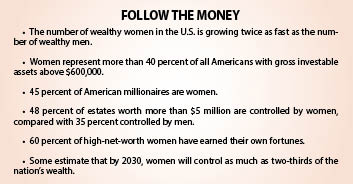Let’s whine just a little: according to the Center for American Progress (CAP), it will take until 2085 for women to reach parity with men in leadership roles in our country. Women hold just 16.9 percent of Fortune 500 board seats with no significant improvement in the last few years. The percentage of women on all U.S. corporate boards has been stuck at 12 percent for a decade and women still make less money than many men in the same exact job. Women make up only 24.2 percent of all state legislators nationwide (in Oregon it’s 28.9 percent).
Now let’s consider the fact that in 1900 fewer than 20 percent of women participated in the labor market while today the number is 75 percent and growing. Women business owners employ 35 percent more people than all the Fortune 500 companies combined. There are about 9.1 million women-owned businesses in the U.S., a number that comprises nearly 40 percent of all businesses. A record number of women—binders full, some say—are serving in Congress, with 20 in the Senate and at least 76 in the House.
While the glass ceiling may not have been completely shattered and Congress is still run by ‘good ole’ boys’ women are successfully going about the business of starting new companies and taking lead roles in the corporate world.
The number of $10-million-plus women-owned firms increased by 57 percent — a growth rate nearly 50 percent more than $10-million-plus firms overall, according to Growing Under the Radar: An Exploration of the Achievement of Million-Dollar Women-Owned Firms.
While just 20 percent of angel investors in 2012 invested in women-led businesses — the percentage grew more than 40 percent from the previous year, according to the Center of Venture Research. Venture capital is an overwhelmingly male-dominated field and men naturally tend to fund the kinds of businesses they can relate to. So how many ideas, then, that could be relevant — even revolutionary — to half the world’s population are being stymied because women can’t access the resources to grow and scale their startups?
Google is aims to help solve the investment shortage by issuing a funded challenge to accelerators, incubators and others to increase women’s participation by 25 percent in 2014. Y Combinator, Forbes named top startup incubator, recently held a female founders conference. And another Silicon Valley based incubator, 500 Startups, announced their intention to pump $1 million into 10 companies with women founders already in their portfolio.
There is good reason to invest in a women-founded company. Venture-backed companies that include females as senior executives are more likely to succeed than companies with only men in charge, according to Women at the Wheel: Do Female Executives Drive Start-Up Success? a report by Dow Jones VentureSource. The SBA Office of Advocacy reports that venture capitalist firms that invest in women-led businesses perform better than all men-led businesses.
WHY DO WOMEN MAKE SUCH GREAT ENTREPRENEURS?
Team Building
One reason could be based in their leadership style by nurturing their staff to obtain rapid growth. They pay close attention to building quality teams and use those resources for creative outcomes. Growth doesn’t happen without employees who are willing and able to deliver excellent products and superior customer service.
Twenty-first-century leadership skills, such as cooperation, communication and sharing are more commonly associated with women, according to John Gerzema and Michael D’Antonio, authors of The Athena Doctrine: How Women (and the Men Who Think Like Them) Will Rule the Future.
Money Managers
The Kauffman Foundation says that women-led private technology companies are more capital-efficient, achieving 35 percent higher return on investment, and, when venture-backed, bringing in 12 percent higher revenue than male-owned tech companies.
This is a great year for women entrepreneurs who are finding early success with crowdfunding, which allows anybody to invest. It’s a natural fit for women who have become the power users of the internet and social media — two skills that are key to being successful in raising money from the crowd.
Using Technology
Women have become the power-users of technologies, such as the internet, mobile and social media. Their innovation has led to women leading some of the most successful technology companies in the world like Marissa Mayer of Yahoo, Sheryl Sandberg of Facebook, Meg Whitman of Hewlett-Packard, Susan Wojcicki of YouTube and Angela Ahrendts of Apple (also among the highest paid CEOs in the country).
One reason technology fields may serve women well is that the industry is young and fast-moving, without the entrenched behaviors and prejudices of a traditional corporate business.
Women Understand What Women Want
Women understand other women. That insight gives them an edge in developing products that better meet women’s needs. With 80 percent of consumer spending controlled by women, and women having considerable influence on spending categories that are considered the domain of men, such as autos and electronics, that is a whole lot of purchasing power for products and services developed by women.
Gaining Credibility
Women are proactively seeking visibility, they recognize the importance of public speaking and awards as essential to telling their company’s story which builds credibility and reputation for their companies. In a world where social media is increasingly used to sell, advertise and cultivate brand loyalties, women are also huge players, outpacing men in the use of every major platform other than LinkedIn.
Networking
Women are beginning to get the importance of networking: The bigger and more diverse your network the more likely your business is to break revenue barriers.
We can imagine a day soon that there will be no reason to single out women as a specific category when we look at the world of business.






